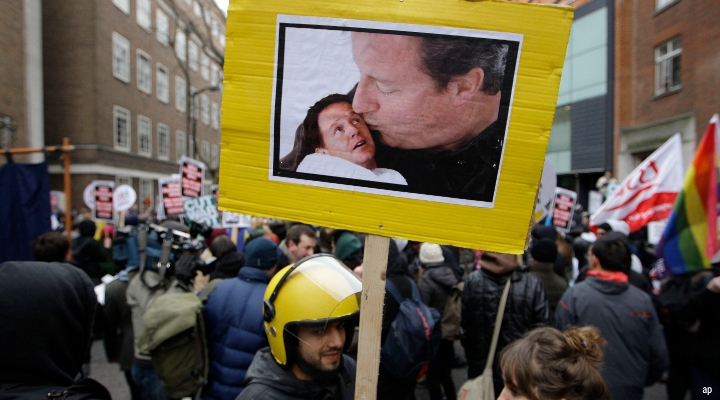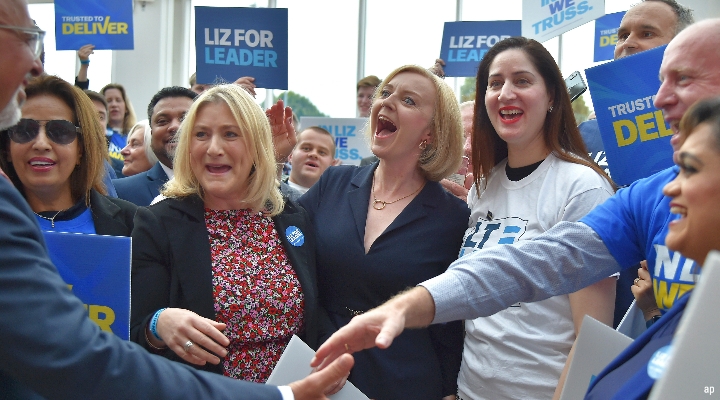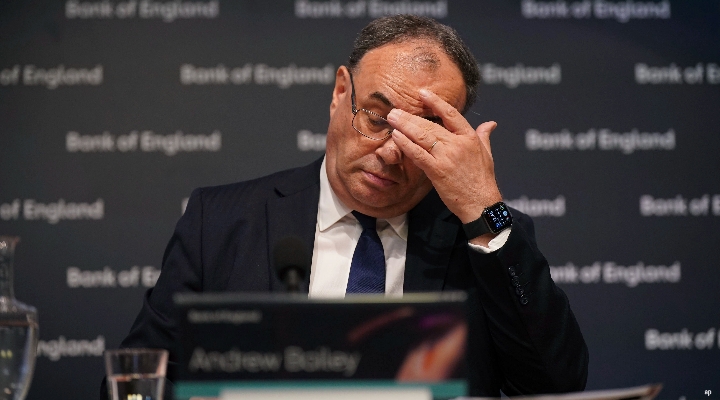
Let me declare a conflict of interest. I am writing about Joe Biden’s student debt relief plan with three caveats. The first – and I avoid mention of this at dinner parties where younger people are present – is that I was in the final ever cohort of students to pay £3,225 per annum for their university tuition. If I was to brag they would be understandably bitter.
The second is I became an adult at precisely the point UK tuition fees were a battleground.
The Liberal Democrats’ commitment to scrapping them, and subsequent blue-tinted u-turn in coalition, was one of the defining political moments of my early adulthood, and it’s something the party is still paying for today. My generation is still paying for it too, not just in diminished political trust, but in the terrible memories we all have of that autotuned Nick Clegg apology song on YouTube. "When we're wrong we hold our hands up; when we're right we hold our heads up too." Honestly.
The final reason is the most personal. I am a reformed Liberal Democrat, sober of their ideas for over a decade. Back in the day I ran for local office locally several times, standing paperless for the party’s Amber Valley wing when I was in my late teens and early 20s, attracting miniscule numbers of votes (I think my record was around 650). It was a very brief and unexciting career.
Broken Promises
In 2006, I had been the party’s youngest ever local president aged 12, attracting the attention of several national newspapers, who all correctly asked why a local Party had entrusted constitutional matters to a child. I don’t think my answer was good enough, though I did say some flattering things on BBC TV about Charles Kennedy at a point where he certainly wasn’t dish of the day.
By 2009 I was 16 and campaigning for candidate April Pond in the Norwich North by-election while on holiday in the area, stuffing envelopes with Nick Clegg. "I agree with Nick" was but a glint in the milkman’s eye, and Clegg himself was being driven around in a Ford Focus.
.jpg)
In 2010 it all changed. At 3am on 7 May I and millions of others watched as the UK descended into the political chaos of a hung parliament, and then later uneasily embraced the anticlimactic banality of coalition government. Clegg did very well out of it, and, among other things, upgraded that Ford Focus to a ministerial Jag. Just the one. He wasn’t greedy like John Prescott.
The coming tuition fee debacle was the scandal that ended my relationship with the party. I was undecided for quite a while, but in the end, like many of the party’s many thousands of young activists at the time, I was unable to reconcile campaigning for an organisation that had dealt such a blow to young people. I had enjoyed working with colleagues locally as I thought they were nice people who wanted sensibly boring answers to big questions, but it was just too much. In one fell swoop we’d ruined a large chunk of our unique selling point.
Good Debt Bad Debt
I frequently witness examples of the UK’s tuition fee debacle being misremembered, or at least remembered with blinkers. For most older people with reasonable opinions of the young, the policy u-turn and resulting fallout were examples of unfairness. But it wasn’t just about that. It was also about brutality and vulnerability.
In London, a university contemporary of mine had the pleasure of being "kettled" at one of the resulting protests against the u-turn, and widespread news coverage was also given to a former pub quiz teammate of mine, Alfie Meadows, who was hit on the head and almost killed by a police officer who battered him with a riot truncheon. The assault left him with life-threatening injuries, a permanent scar from brain surgery, and a charge of disorderly conduct in court. His assailant wasn’t even suspended from duty pending an investigation.
For many people who were there, the question was not just "why has the coalitiom done this to us?” but “why is ‘civilised society’ behaving in this way towards intelligent and hard-working young people who care about their futures?"
In the face of the UK’s current political and economic malaise, all this may take on the appearance of matters trivial. It was a while ago. It almost feels like I’m asking you to think about the Lewinsky Affair as the US invades Iraq. But it really matters.

To focus on the US, Joe Biden’s plan to forgive student debt will effectively cancel up to $10,000 in federal student debt per borrower.
Participants in the Pell Grant scheme – which funds college education for talented students who demonstrate exceptional potential – will be eligible for double that. Single individuals earning below $125,000 per annum, or people married and collectively earning less than $250,000 per annum will be able to claim under the scheme.
There are problems. There are always problems. It’s already been pointed out by at least one publication that the plan contains a loophole that could incentivise some colleges to charge higher fees for tuition, rendering life more difficult for students of the future. But for the most part it’s fair to call the policy historic.
Is a counterpart policy in the UK needed or even wanted in the UK? Before the tuition fee hike, most students and graduates could regard their debts as "good" – in the sense that a) they funded something worthwhile and b) the interest rates were well below those of a personal bank loan or (god forbid) a loan shark. But increased fees, a business culture pervading universities, the desire to fund much more expensive facilities to attract foreign talent, and the threat of interest rate hikes on debts amounting to tens of thousands of pounds has changed that.
You’ll still meet graduates who take the laissez-faire attitude of "well, it’s never getting paid off, so it’s not worth worrying about," but for the more anxious, a debt is still a debt. What’s more, writing off debt may provide some kind of settlement to a specific cohort now, but it doesn’t answer the bigger questions: does our society incentivise study, sacrifice and (eventually) graduate work in the correct way, and, crucially, is the intergenerational contract working?
Against that backdrop, UK policy makers must also weigh up other ways in which the answer to both those questions might be "no." For many young people, property is unaffordable without help and, in a cost of living crisis, rent and bills may become unaffordable too. No debt relief plan or graduate tax will solve all those issues. But that’s sort of the problem. For many years, UK chancellors have been behaving as though medium-sized policies like tax changes will solve deeper problems within society. They don’t. Just look at the Lifetime ISA.
Big Thinking
It’s no surprise that Biden’s policy begs comparison with the big picture thinking demonstrated by the US after the Second World War, when millions of its service personnel were at risk of being de-mob unhappy without opportunities for learning and personal growth. But you’ll have to curb your enthusiasm. Running a fair society requires more than that. It requires a plan. "Stronger Economy, Fairer Society" is just a Lib Dem slogan.
In the UK, there are few politicians who truly stake their reputations on big ticket policies to fix the future in this way. One that springs to mind is George Freeman, the Conservative MP for Mid-Norfolk (there’s something about Norfolk), who has spent a decent amount of time speaking and writing about education, life chances, and industrial strategy. But for all the committees, papers and proposals, we are where we are, and rate hikes by the Bank of England can’t be depended on to fix the roof we didn’t fix while the sun was shining.

It's difficult to quantify, but anecdotally speaking I suspect strong disdain for students in this country. It’s highly possible it’s never been higher. One of the front lines of our current culture war era is the war on the "woke" young, who have been building themselves a much more entreprenurial, gender fluid, self-aware and politically active environment than even the one I lived in just 10 years ago. If they don't want to hear Laurence Fox speak on campus then that's probably pretty sensible. Young people are smart.
But as for a debt relief plan, if it can happen in the US, a debt relief plan should be possible here. But it likely won’t. To that end, UK students - and grads - can get in the queue.
Ollie Smith is UK Editor at Morningstar




























